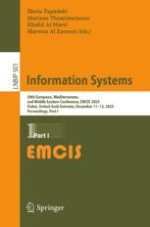Abstract
In market-based economies often appear significant decreases of economic activity, which lead to recessionary economic crises. These economic crises have quite negative consequences for firms, as they lead to significant decrease of their sales revenues; firms respond by decreasing on one hand their production and in general operational activities and expenses, personnel employment and materials’ procurement, and on the other hand their investments in production equipment, digital technologies, etc., which leads to technological obsolescence. This reduction of investments, and especially of the ones in digital technologies, due to their importance for firms’ efficiency, effectiveness, and innovation, can have quite negative impact on their future competitiveness, and even put at risk their survival. However, these negative consequences of economic crises differ significantly among firms: some of them exhibit a lower vulnerability to the crisis, so they have less negative consequences, while some other firms exhibit a higher vulnerability, and have more negative consequences; so the competitive position of the former is significantly strengthened with respect to the latter, and finally the former are the ‘winners’ of the crisis, while the latter are the ‘losers’. This paper proposes a methodology for predicting the winner and loser firms of future economic crises with respect to a highly important class of technologies: the digital technologies. In particular, the proposed methodology enables the prediction of the multi-dimensional ‘pattern of digital vulnerability’ of an individual firm to a future economic crisis, which consists of the degrees of reduction of the main types of ‘digital investments’ as well as ‘digital operating expenses’ in a future economic crisis. For this purpose, we are using Machine Learning algorithms, in combination with the Synthetic Minority Oversampling Technique (SMOTE), in order to increase their performance, which are trained using open government data from Statistical Authorities. Furthermore, a first application/validation of the proposed methodology is presented, using open data from the Greek Statistical Authority for 363 firms for the severe Greek economic crisis period 2009–2014, which gave satisfactory results concerning the prediction of nine different aspects of digital vulnerability to economic crisis (five of them concerned the main types of digital investment, and the other four concerned the main types of digital operating expenses).
